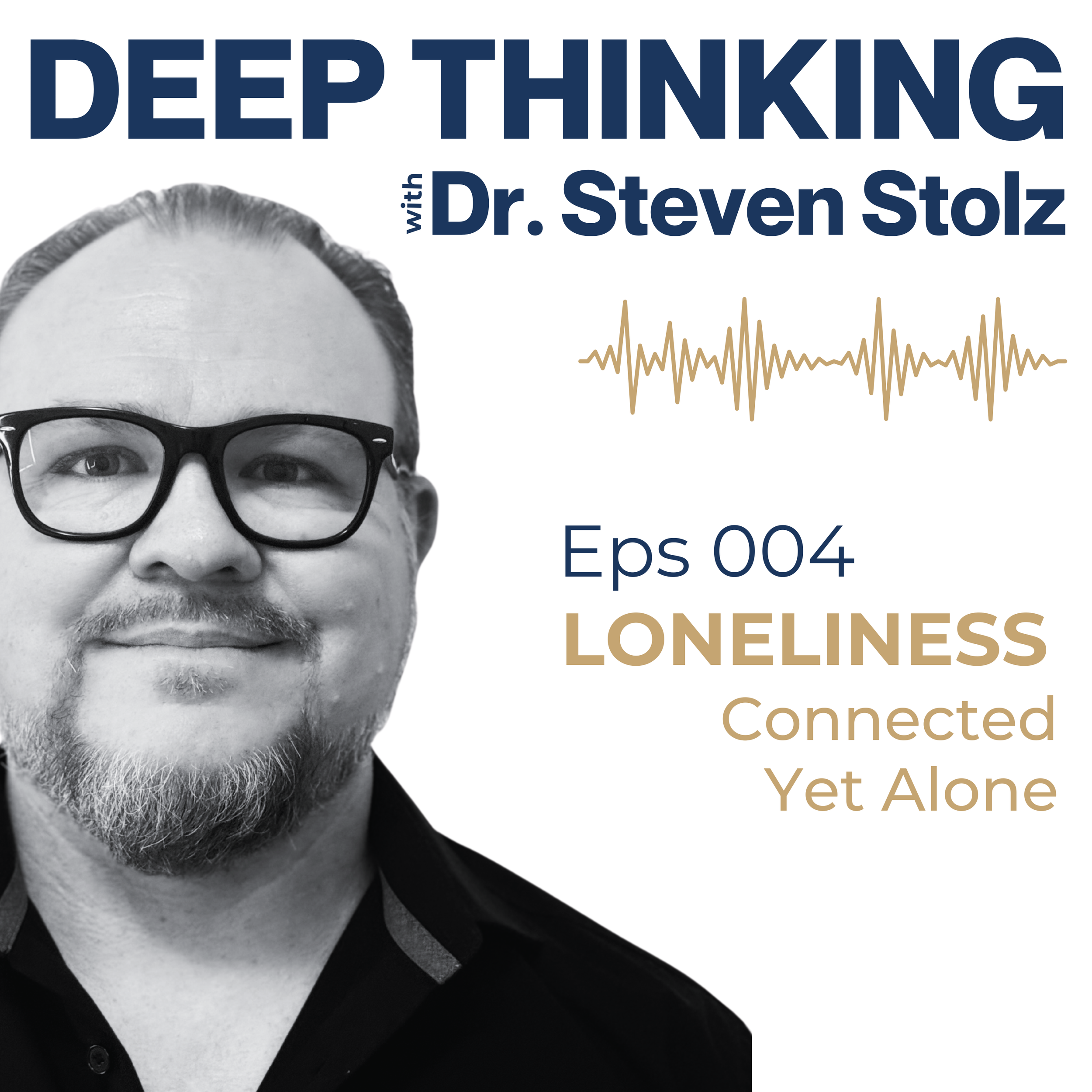The Loneliness Epidemic: Connected Yet Alone
Episode 4: The Loneliness Epidemic: Connected Yet Alone
Episode Description
In this deep dive, Dr. Steven Stolz explores the paradox of modern loneliness – why we feel increasingly isolated despite unprecedented connectivity. This episode examines the science behind loneliness, its widespread impact, and evidence-based strategies to build meaningful connection in a digital age.
Listen On
Part 1: Understanding Loneliness
The Science of Loneliness: What loneliness actually is from a psychological and neurological perspective
Public Health Crisis: How loneliness has become a hidden epidemic affecting physical and mental health
Modern Drivers of Social Isolation:
Changes in work culture and remote environments
Living arrangement trends and community dissolution
Aging populations and generational disconnection
Health Impacts Beyond Emotional Pain:
Increased cardiovascular risks
Immune system suppression
Links to depression and anxiety
Suicide risk factors and prevention
The Loneliness Profile: Research-based characteristics of chronic loneliness
Emotional manifestations
Cognitive patterns and thought distortions
Behavioral tendencies that reinforce isolation
How loneliness evolves over time
Part 2: Evidence-Based Approaches to Overcome Loneliness
Research-Backed Strategies
Self-Awareness and Acknowledgment: Recognizing loneliness without shame
Social Skills Development: From small talk to authentic self-disclosure
Mental Health Integration: Addressing underlying conditions
Active Listening Techniques: Building deeper connections through presence
Healthy Digital Connection: Using technology to enhance rather than replace relationships
Stress Management for Social Anxiety: Practical techniques for social engagement
Community Engagement Pathways: Interest groups, volunteering, and local involvement
Animal Companionship Benefits: Research on pets and loneliness reduction
Structured Social Exposure: Progressive steps to increase social contact
Realistic Expectation Setting: Understanding the timeline of relationship building
Part 3: Dr. Stolz's Personal Framework
Third Space Cultivation: Finding neutral social environments beyond home and work
Comfort Zone Expansion: Embracing unexpected social opportunities
Interest-Based Connection: How hobbies create natural social bridges
Ambient Companionship: The role of media, music, and podcasts
Laughter as Social Medicine: Humor's role in connection
Gratitude Practice: Shifting perspective on existing relationships
Digital Detox Protocol: Assessing and adjusting social media consumption
Loneliness Acceptance Strategies: Living with and through periods of aloneness
Professional Support: When and how to seek therapeutic assistance
Key Takeaways
Biological Reality of Loneliness: Scientific evidence confirms loneliness as a universal human experience with measurable neurological and immunological effects
Quality Over Quantity Principle: Research consistently shows that meaningful connections with few people better combat loneliness than numerous shallow interactions
Patience and Intentionality Requirement: Long-term studies demonstrate that sustainable relationship building follows predictable phases requiring both deliberate action and realistic timelines
Internal-External Balance: Psychological research confirms effective loneliness intervention requires both cognitive restructuring (internal) and behavioral engagement (external)
Evidence-Based Intervention Efficacy: Clinical studies show implementing structured approaches can reduce subjective loneliness by 20-30% within 8-12 weeks when consistently applied
Bibliography
Carter, W. L., Meier, P., & Minirth, F. (1982). Overcoming Loneliness. Grand Rapids, MI: Fleming H. Revell.
Fromm-Reichmann, F. (1959). Loneliness. Psychiatry: Interpersonal and Biological Processes, 22(1), 1−15.
Hawkley, L. C., Burleson, M. H., Berntson, G. G., & Cacioppo, J. T. (2003). Loneliness in everyday life: Cardiovascular activity, psychosocial context, and health behaviours. Journal of Personality and Social Psychology, 85, 105−120.
Healey, J. (Ed.). (2020). Loneliness and Social Isolation. Thirroul NSW: The Spinney Press.
Heinrich, L., & Gullone, E. (2006). The clinical significance of loneliness: A literature review. Clinical Psychology Review, 26, 695–718.
Horowitz, L. M., French, R. D., & Anderson, C. A. (1982). The prototype of a lonely person. In L. A. Peplau & D. Perlman (Eds.), Loneliness: A Sourcebook of Current Theory, Research and Therapy (pp. 183−205). New York: Wiley.
Jeste, D., Nguyen, T., & Donovan, N. (Eds.). (2023). Loneliness: Science and Practice. Washington DC: American Psychiatric Association Publishing.
Jones, W. H., & Hebb, L. (2003). The experience of loneliness: Objective and subjective factors. The International Scope Review, 5(9), 41−68.
Laing’s O. (2016). The Lonely City: Adventures in the Art of Being Alone. Edinburgh, UK: Canongate Books.
Marangoni, C., & Ickes, W. (1989). Loneliness: A theoretical review with implications for measurement. Journal of Social and Personal Relationships, 6, 93−128.
Nietzsche, F. (1878/1996). Human, All Too Human: A Book for Free Spirits: Volume I and II [Menschliches, Allzumenschliches: Ein Bucg für freie Geister] (Translated by R. J. Hollingdale and Introduction by R. Schacht). Cambridge, UK, Cambridge University Press (original work published 1878).
Peplau, L., & Perlman, D. (1982). Perspectives on loneliness. In L. Peplau & D. Perlman (Eds), Loneliness: A Sourcebook of Current Theory, Research, and Therapy (pp.1–18). New York: Wiley.
Roberts, T., & Krueger, J. (2021). Loneliness and the emotional experience of absence. The Southern Journal of Philosophy, 59(2),185–204.
Rossi, M. (2023). What is Loneliness? Towards a Receptive Account. Topoi: An International Review of Philosophy, 42, 1109–1122.
Connect With Us
Have questions about loneliness or suggestions for future episodes? Reach out at deepthinking@stevenstolz.com or visit stevenstolz.com/podcast for additional resources related to this episode.
Follow Deep Thinking:
Apple Podcasts | Spotify | YouTube Podcasts | Amazon Music
Connect on Social Media:
Instagram: @drstevenstolz | Facebook: @DeepThinkingPodcast | LinkedIn: Dr. Steven Stolz | X: @drstevenstolz
© 2025 Dr. Steven Stolz. All rights reserved.

